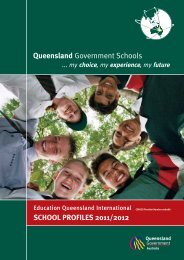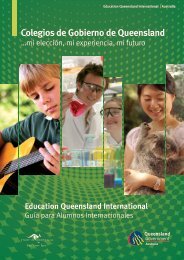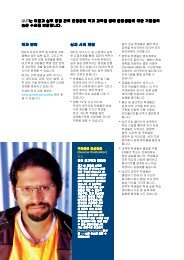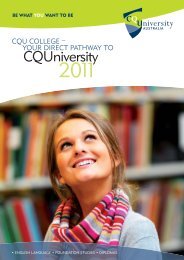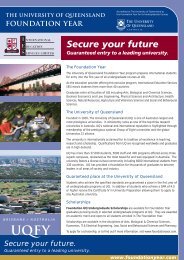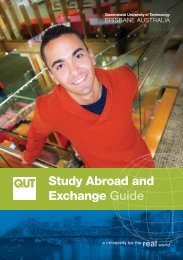UNDERgRADUATE PROSPECTUS - Study Brisbane
UNDERgRADUATE PROSPECTUS - Study Brisbane
UNDERgRADUATE PROSPECTUS - Study Brisbane
- No tags were found...
You also want an ePaper? Increase the reach of your titles
YUMPU automatically turns print PDFs into web optimized ePapers that Google loves.
Bachelor of<br />
Arts<br />
Program code 2000<br />
Location St Lucia<br />
Commencement semester 1, 2<br />
Duration Three years full-time<br />
Admission requirements Year 12 or equivalent English<br />
(see page 92)<br />
Honours Available as an additional year of study<br />
Program outline<br />
A Bachelor of Arts (BA) degree will give you a better<br />
understanding of how human beings make, recognise,<br />
and argue about life’s meaning and the values that<br />
support civilisation. A BA graduate is someone who<br />
has gained skills and knowledge, not just in a subject<br />
area but also in written communication, critical<br />
thinking, and problem-solving, and can apply these<br />
skills to many different jobs, careers and life situations.<br />
The program provides you with highly developed skills<br />
in written communication, problem-solving, critical<br />
thinking and interpersonal understanding. You will<br />
have a wide choice of academic subject areas with<br />
courses in the core disciplines of humanities and<br />
social sciences, and can choose from several majors,<br />
tailoring the degree to suit your own particular career<br />
aspirations. You can undertake two single majors, or a<br />
more concentrated extended major and a minor, plus<br />
a range of electives. The honours program requires an<br />
additional year, and calls for greater specialisation in<br />
a chosen area at a high standard of scholarship. The<br />
program is also available in dual degree format with a<br />
range of other UQ degrees.<br />
Majors<br />
Aboriginal and Torres Strait Island Studies<br />
This major will help you appreciate the unique way<br />
that Aboriginal and Torres Strait Islander people see<br />
the world. You will gain a deep understanding of<br />
Indigenous perspectives on everyday life in Australia<br />
today, as well as on the major social, economic, and<br />
political events and processes in Australia’s history. You<br />
will learn first-hand from Aboriginal and Torres Strait<br />
Islander teachers, as well as from non-Indigenous staff<br />
who work closely with Indigenous communities.<br />
Ancient History<br />
The early Mediterranean cultures provide the<br />
foundations of much of Western civilisation, and<br />
their study is relevant today. In this major, you<br />
will learn about ancient civilisations and cultures,<br />
including Greece and Rome. Their history, literature,<br />
religion, philosophy, social customs, art and<br />
architecture are examined in depth. With ancient<br />
society and traditions influencing the customs and<br />
culture of our current society, this focus will provide<br />
you with an understanding of the basis of many<br />
facets of current society.<br />
Ancient History/History<br />
The Ancient History/History major will provide you<br />
with a wide breadth of knowledge of history across<br />
the ancient and modern worlds. Ancient history<br />
allows you to examine the early Mediterranean<br />
cultures, including their literature, religion,<br />
philosophy, social customs, art and architecture.<br />
With ancient society and traditions influencing the<br />
customs and culture of our current society, this<br />
focus provides an understanding of the basis of<br />
many facets of current society. History teaches you<br />
how to interrogate the past and enter into dialogue<br />
with the forces that have shaped the world.<br />
Anthropology<br />
Anthropology is the study of human life and<br />
experience in all its diversity and richness, ranging<br />
from small-scale Indigenous peoples to the modern<br />
capitalist world system with all its globalising<br />
processes. Anthropologists have many different<br />
perspectives on the study of human societies and<br />
culture, past and present, and they consider a range<br />
of interpretive questions, the broadest being “why<br />
do people do what they do?” Since anthropology<br />
employs a broad approach, it also draws on other<br />
disciplines, such as human biology, ecology,<br />
linguistics, history, politics and psychology.<br />
Archaeology<br />
Archaeology is the scientific study of the human<br />
past, and archaeologists search out and excavate<br />
ancient sites and examine artefacts for clues about<br />
how various peoples and cultures developed and<br />
changed through the ages. Archaeologists at UQ<br />
undertake research of international importance,<br />
and their varied interests take them into the field in<br />
Australasia, the Pacific (Hawaii, Easter Island), the<br />
Mediterranean and Near East (Pompeii, Turkey), the<br />
Maya region of Central America, India, and France.<br />
In Australia, they study the archaeology of 50,000<br />
years of Aboriginal settlement as well as the post-<br />
European colonisation period.<br />
Art History<br />
Art History is the study of the objects considered<br />
to be art across a variety of cultures and times.<br />
This major looks at paintings and sculptures, and<br />
modern works of art that can’t really be called either<br />
of these, as well as Aboriginal art and the art of the<br />
Asia Pacific region. The major also looks at films,<br />
and, in the more advanced courses, answers that<br />
famous question, “what is art?”<br />
Asian Studies<br />
Whether for work, study or pleasure, dealing with<br />
Asia requires a knowledge of sometimes vastly<br />
different societies. This major will provide you with<br />
a flexible way of getting to know the region and<br />
the opportunities that await you, without having<br />
to learn a foreign language. All teaching of Asian<br />
studies courses is in English. Asian Studies will<br />
introduce you to the diverse cultures and histories of<br />
the countries in the region. You will learn about the<br />
political and economic systems of the countries and<br />
their ramifications for Australia.<br />
Chinese<br />
China not only has one of the oldest and most<br />
splendid cultures, but is now an increasingly<br />
important player on the world economic and political<br />
scene. Chinese is spoken by one in every six<br />
people in the world today, and is the most common<br />
language spoken in Australia after English. China<br />
and Australia also have close economic and cultural<br />
ties. The Chinese major offers courses in spoken<br />
and written language from introductory to advanced<br />
levels. There are separate majors for native speakers<br />
of Mandarin and other Chinese dialects. You can<br />
undertake specialist courses in literature, culture,<br />
translation, business and language teaching.<br />
Classical Languages<br />
One fascinating way to explore the depths of<br />
another culture is to familiarise yourself with<br />
the languages in which its ideas were originally<br />
presented. Classical Greek and Latin will provide<br />
you with a basis to further your reading and writing<br />
skills in two of the oldest languages in the world.<br />
These two classical languages have traditionally<br />
held a central position in Western education, and<br />
they remain important for the study not only of the<br />
Greco-Roman world, but also of the languages,<br />
ideas and literatures (including English) of societies<br />
that grew out of the classical world.<br />
Criminology<br />
The Criminology major can be distinguished by<br />
its focus on the public policy implications of crime<br />
in a way that is both theoretically informed and<br />
methodologically rigorous. The major is strongly crossdisciplinary<br />
and will enable you to combine criminology<br />
with other fields of study, such as sociology, political<br />
science, law, psychology, history and philosophy. You<br />
will become highly trained in social research methods<br />
and critical thinking, and will examine crime and its<br />
regulation within the context of social, economic and<br />
political shifts in contemporary society.<br />
Drama<br />
Seeing and critiquing professional performance,<br />
reading plays from around the world and from the<br />
past 2000 years, and honing your performance skills<br />
are all part of the Drama major. You will learn how to<br />
interpret theatre through time and space, but you will<br />
also be challenged to think about what constitutes<br />
performance, not only on the stage, but also on<br />
the page and in everyday life. You will develop an<br />
understanding of the theatrical and literary aspects<br />
of drama, from ancient Greek classics to Medieval<br />
theatre to the most recent Australian and European<br />
plays. You do not have to audition, but there are<br />
practical performance options at advanced level.<br />
Economics<br />
Economics is the science of decision-making.<br />
Individuals, communities, companies and<br />
governments face choices every day, weighing<br />
up the costs and benefits of decisions. With the<br />
ongoing momentum of globalisation, development,<br />
economic/financial/cultural integration, and<br />
increasing pressure for ecological sustainability,<br />
economics remains the key element. Economics<br />
determines much of today’s social and political<br />
landscape, and graduates are exceptionally well<br />
positioned to play a leading part in the future<br />
direction of business, government, and society.<br />
English<br />
English is the medium of communication, business,<br />
and entertainment for millions of people around the<br />
world. From witty plays and elegant films to pungent<br />
protest songs and complex novels, it allows people<br />
to formulate and convey their particular vision of the<br />
world and their often urgent desire to celebrate or<br />
improve it. In this major, you will examine examples<br />
of English at work in different circumstances,<br />
ranging from poetry to television and the Internet.<br />
English Language and Communication<br />
As the world’s most global language, English<br />
permeates almost all aspects of our daily social<br />
lives, from face-to-face interaction to professional<br />
presentations, and from emails to report writing.<br />
The English Language and Communication major<br />
combines a study of the structural organisation of<br />
the English language with its role in communication<br />
practice to explore the many ways English can<br />
be used in societies, large and small. Courses in<br />
this major are designed to develop an awareness<br />
of language as a central part of the practice of<br />
communication as well as an awareness of the role<br />
of English in cross-cultural contexts.<br />
English Literature<br />
This major will introduce you to one of the world’s<br />
key literary traditions, as well as to contemporary<br />
global English language literary culture. To undertake<br />
the formal study of English literature from its<br />
beginnings to the present day is to be introduced<br />
to a vast intellectual and cultural history – one that<br />
records the almost infinitely different ways in which<br />
men and women, from a great variety of different<br />
times and places, have lived, thought, argued, felt<br />
and imagined. Many of the novels, poems, plays<br />
and non-fictional works you will encounter in this<br />
major rank amongst the greatest products of the<br />
human mind. This major will also introduce you to<br />
some influential ways of thinking about literature.<br />
Film and Television Studies<br />
Film and Television Studies involves the critical study<br />
of film and television texts. It introduces the language<br />
of film and television and the principal ways in which<br />
they are written about and analysed. The key focus is<br />
on popular film and television and the contexts within<br />
which they are produced. You will look at various film<br />
movements, including Australian cinema, and films in<br />
a range of foreign languages, as well as various film<br />
and television genres.<br />
French<br />
In this major, you will study French language and<br />
culture concurrently. Whether you wish to study<br />
French because it is one of the major diplomatic<br />
languages of the world, because you want to do<br />
business with members of the massive Francophone<br />
population, because you have always been<br />
fascinated by one of the richest and most influential<br />
Western cultures in existence, or simply because it<br />
66<br />
UNDERGRADUATE <strong>PROSPECTUS</strong> FOR INTERNATIONAL STUDENTS 2012




